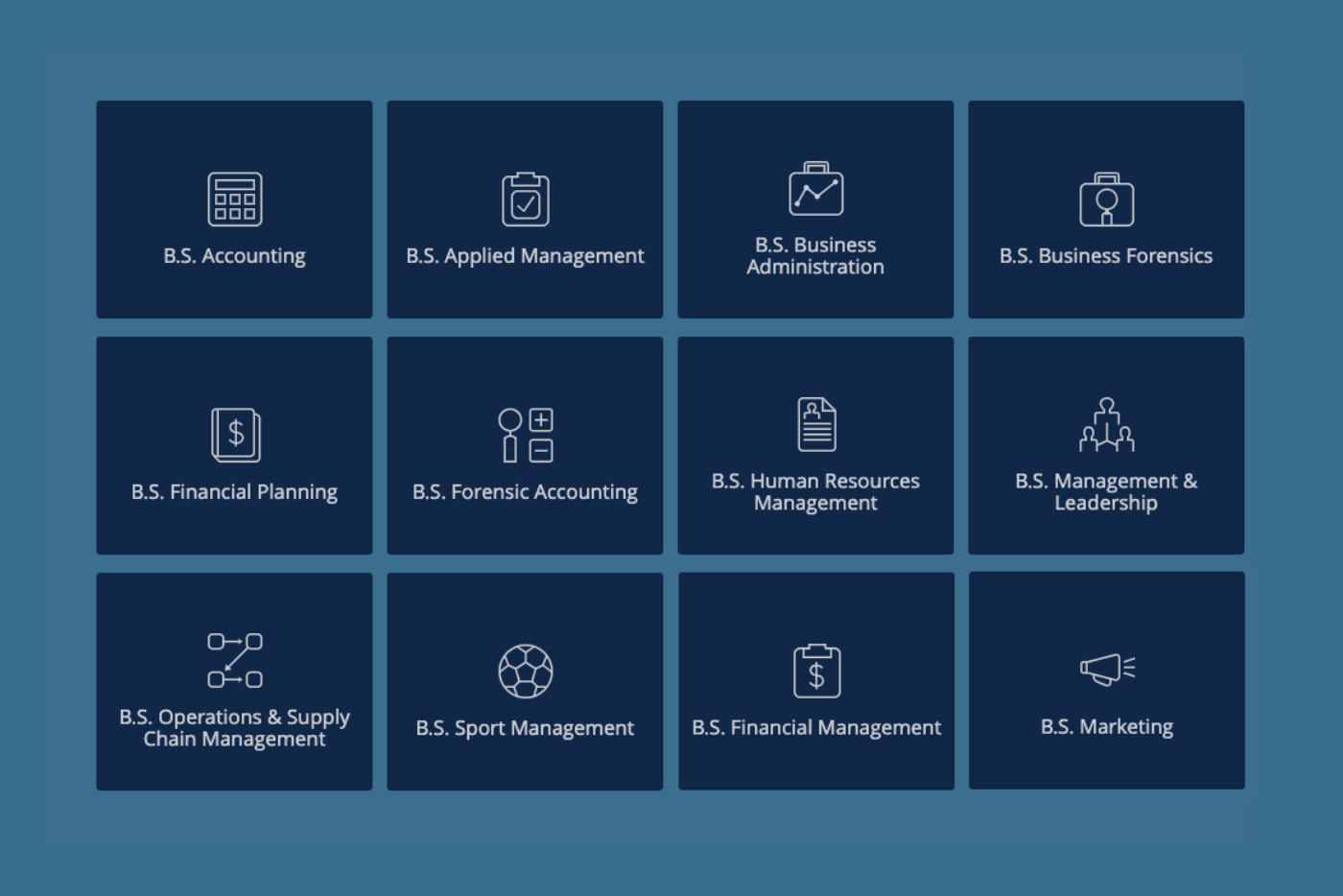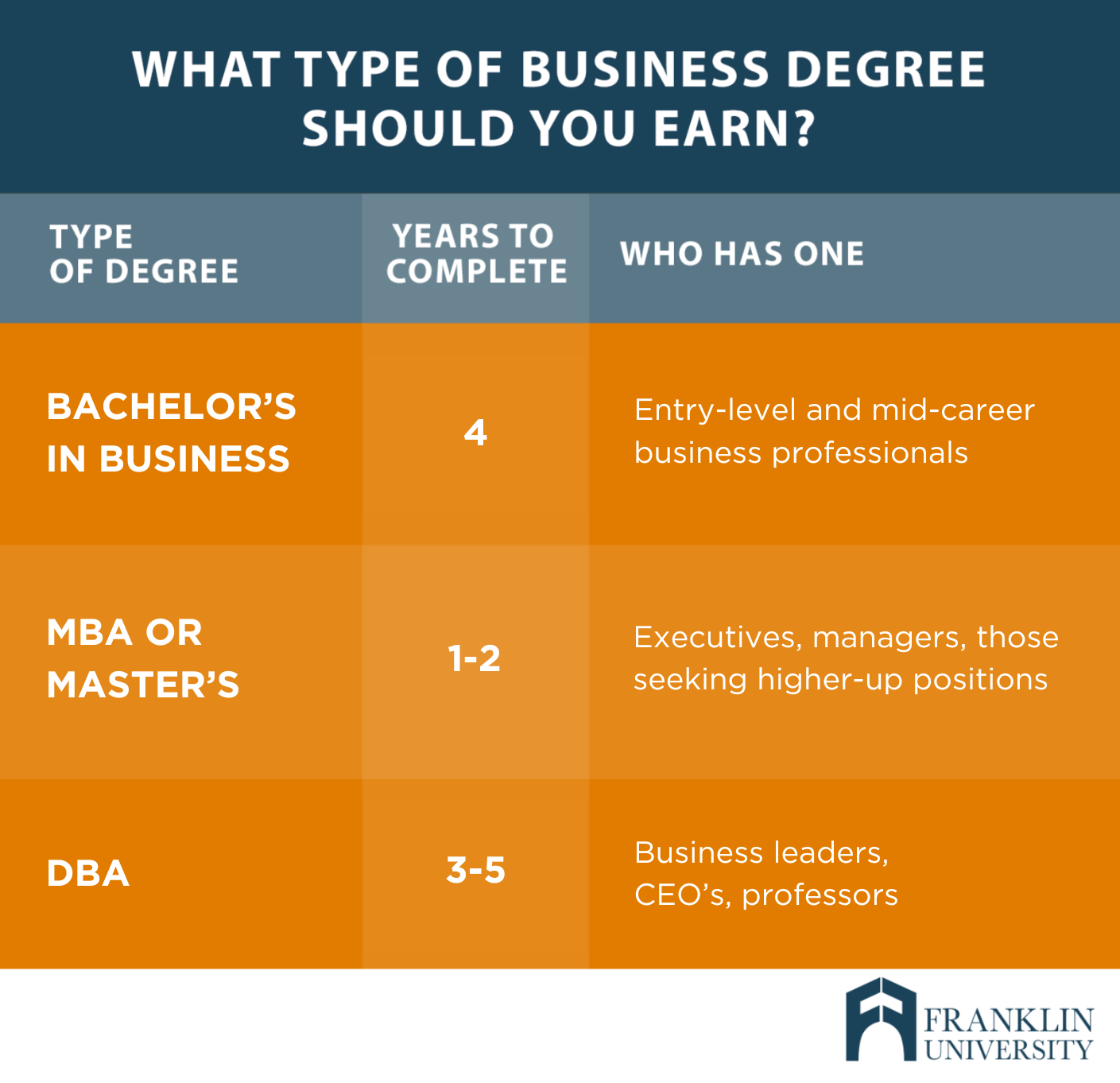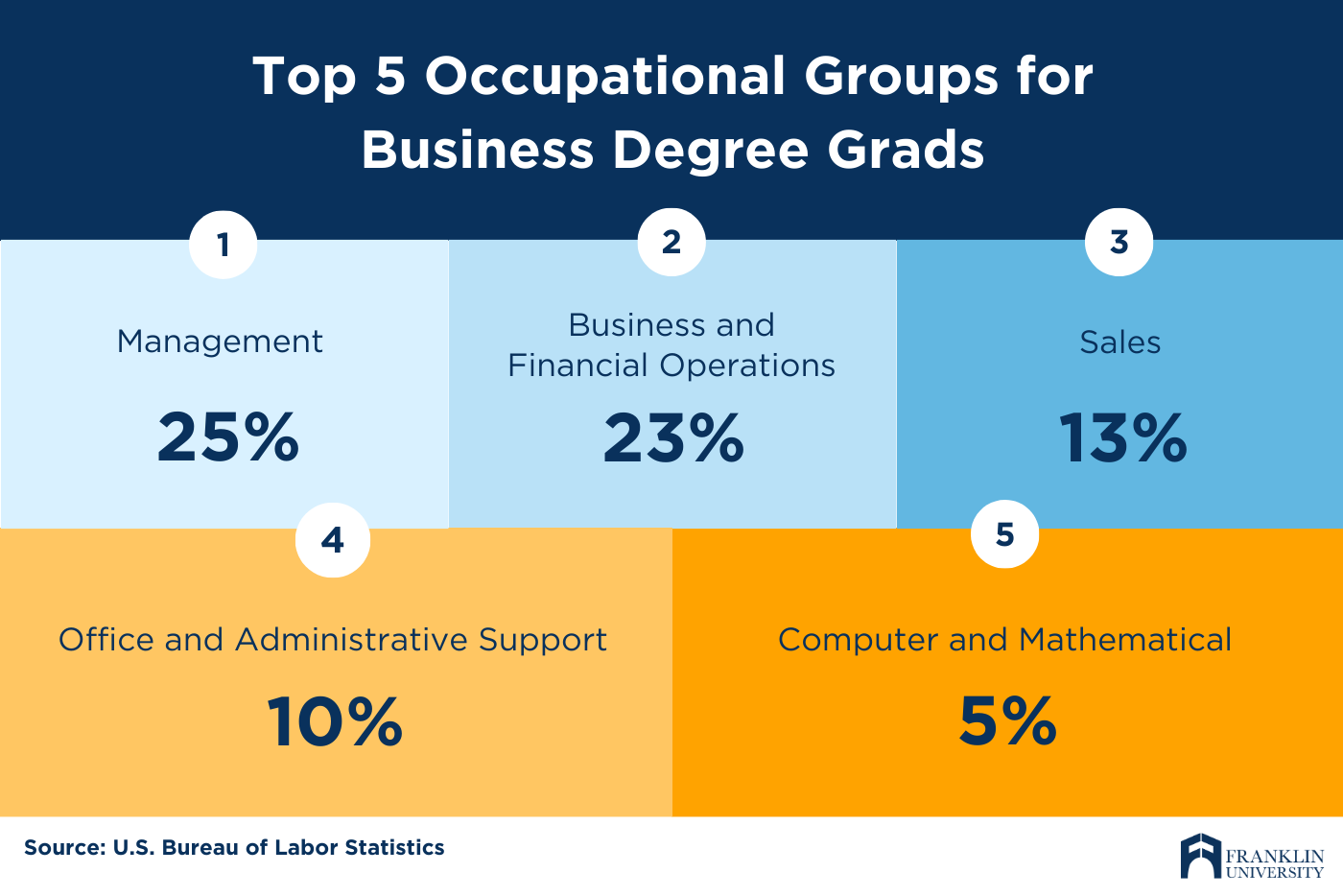Request Information
We're Sorry
There was an unexpected error with the form (your web browser was unable to retrieve some required data from our servers). This kind of error may occur if you have temporarily lost your internet connection. If you're able to verify that your internet connection is stable and the error persists, the Franklin University Help Desk is available to assist you at helpdesk@franklin.edu, 614.947.6682 (local), or 1.866.435.7006 (toll free).
Just a moment while we process your submission.

What Can You Do with a Business Degree? More Than You Think.
Business degrees are the best. Well, they are at least among the most common degrees, says the Education Data Initiative. In fact, according to EDI, 19.5% of people earning a bachelor’s degree earn their degree in business whereas 23.4% of those who earn a master’s degree earn their MBA (master’s in business) degree.
With a higher than average median annual wage of $65,000 (compared to $60,000 for all fields), it’s no wonder that business degrees are popular. But that’s only the beginning of the story.
According to the U.S. Bureau of Labor Statistics (BLS), there are nearly 12.5 million workers with business degrees, 48% of which majored in general business or business management and administration.
But what exactly can you do with a business degree? Quite a lot! A business degree is likely behind more career paths, job opportunities and top-paying jobs than you might think.
What Is a Business Degree?
A business degree can prepare you for a wide variety of roles by introducing you to the theories and concepts behind all business disciplines, including finance, marketing, management and administration. Even better, a business administration degree from a high-quality, accredited university can teach you how to apply these theories to real-world problems.
Bachelor’s: Types of Business Degree Specializations
When it comes to earning your bachelor’s in business, you have options–lots of them. Business degree specializations include:

- Accounting: financial reporting and analysis, cost management, accounting ethics
- Applied Management: entrepreneurship, project management, strategic planning
- Business Administration: business strategy, business ethics, management and operations
- Business Forensics: organizational behavior, ethics and compliance, threat assessment
- Financial Management: forecasting, cash management, financial risk management
- Financial Planning: tax planning, investment strategies, debt management
- Forensic Accounting: business law, process controls, fraud examination
- Human Resources Management: staffing, training, team building
- Management & Leadership: transformational leadership, performance management, change management
- Marketing: strategy, market research, digital advertising
- Operations & Supply Chain Management: strategic sourcing, procurement, inventory management
- Sport Management: sports marketing, athletic administration, program management
When it comes to paying for school, grants are among your best options. But do you know how to find them? Remove the guesswork by downloading this free guide
Business Degree Specializations by the Numbers
With the right bachelor’s in business degree program, you’ll learn industry best practices as well as develop knowledge specific to your intended career path..png)
In case you’re wondering, the BLS reports that 88% of business students choose to major in these specific concentrations:
28% Business Management and Administration
20% General Business
18% Accounting
11% Finance
11% Marketing and Market Research
Start Your Career with a Business Degree
If you’re just starting out with little to no work experience, an undergraduate degree in business can help you get your foot in the door in a wide variety of occupations.
According to labor market analytics firm Lightcast, there were more than 25 million jobs in 2022 for those with a business administration degree. Occupations ranged from customer service to retail to sales to operations and manufacturing.
“A business administration degree is extremely broad, which means you’ll be introduced to all the functional areas,” says Doug Ross, Ph.D., program chair, business administration at Franklin University. “If you’re well versed in how business runs and you can find an employer willing to hire and train you, there are a lot of different paths where you can start your career, including business analyst and project manager.”
Here’s a look at just a few of the many entry-level positions for business grads with little to no work experience:
Project Management Specialist
Project management specialists coordinate schedules, budgets and project details, as well as act as the primary point of contact for the client or customer.
- Starting Salary: $49,750
- Median Annual Wage: $94,500
Budget Analyst
Budget analysts prepare reports, monitor spending and evaluate programs for return on investment.
- Starting Salary: $49,330
- Median Annual Wage: $79,940
Customer Service Representative
Customer service representatives provide customers with information about products and services, process orders and resolve issues.
- Starting Salary: $26,353
- Median Annual Wage: $36,920
Business Degree Business Master’s or DBA: How to Advance Your Career
Perhaps you aspire to a more influential leadership role–and a higher salary. If so, it’s likely you’ll need a master’s in business (MBA) or a business doctorate (DBA).

Business Degree: Top 5 Occupations
According to the BLS, 76% of business degree graduates work in one of five occupational groups:
1. Management
2. Business and Financial Operations
3. Sales
4. Office and Administrative Support
5. Computer and Mathematical

But that’s just the occupational groups. Within those five groups, there are literally hundreds of job titles and thousands of job opportunities for those with a business degree.
“Business administration is our largest degree program,” says Dr. Ross. “It’s also the fastest path to a college degree for busy, working adults, especially if you take advantage of transfer credits. A degree in business administration is so varied that whatever you’re currently doing, it can make you more promotable and help you take your career to the next level.”
Take the Next Step
Now that you know just what you can do with a business degree, it’s up to you to get started.
So, whether you’re looking to earn a bachelor’s in business or get your MBA or DBA, the first step is to find a program that matches your interests and aligns with your career goals.
Here are some additional resources for choosing a school.





